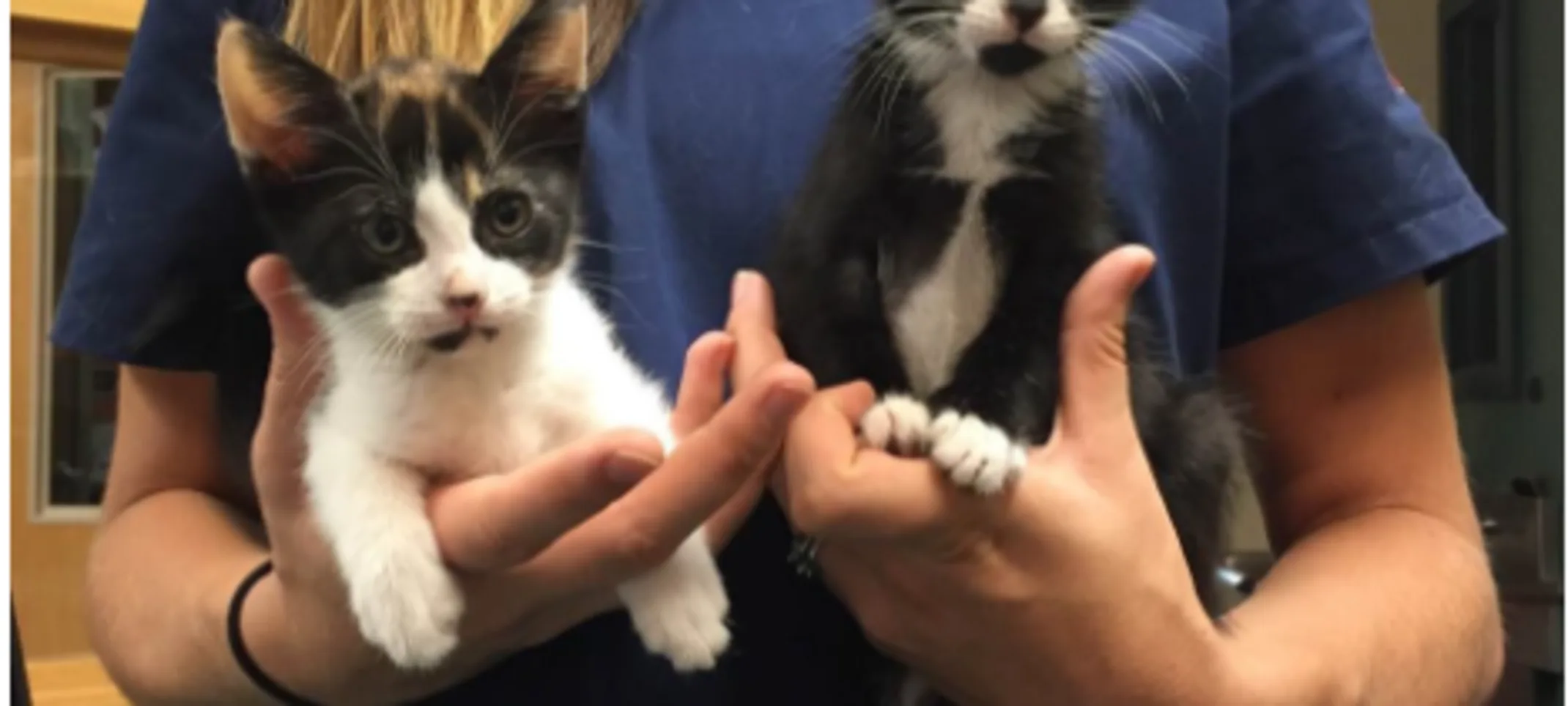Princeton Animal Hospital & Carnegie Cat Clinic
Kitten Wellness
The very basic requirements for life are food and water. Good nutrition is the foundation of overall health. No cat can survive without food.

Good Nutrition
The very basic requirements for life are food and water. Good nutrition is the foundation of overall health. No cat can survive without food. Cats are natural carnivores and usually require meat-based diets. Luckily, cat owners can choose from a variety of diets certified by the Association of American Feed Control Officials. These products are available from your veterinarian, your feed store or from your grocer. Pet food manufacturers spend huge sums of money touting the benefits of their products and the feeding trials conducted by the AAFCO in order to verify that their pet foods meet quality standards. According to your pet's needs, your veterinarian may recommend a particular diet for your kitten, your adult cat and / or your senior cat.
Nutritional needs vary with the cat's age and health status. Kittens should consume growth diets until they reach approximately 9 months of age. At this age, young cats can be gradually weaned from kitten food to adult cat food. This should be done by gradually increasing the amount of adult food and decreasing the amount of kitten food over several days. Abruptly changing the diet can lead to intestinal disturbances with diarrhea. Cats entering their golden years should transition from adult food to senior cat food in a similar manner. Specialty diets that address dental disease and hairballs are good preventive medicine diets that help avoid these health problems in susceptible cats.
Immunization Program
Rabies needs to be incorporated into every immunization program. Rabies is transmitted by bite wounds and vaccination protocols are often dictated by state or municipal regulations. Vaccinating cats helps prevent the transmission of rabies to humans.
Feline Panleukopenia is transmitted from one cat to another particularly through feces. The virus is very resistant and can survive in the environment for more than a year. Since maternal antibodies interfere with immunizations, a series of vaccinations needs to be given.
Vaccination is highly effective for prevention of feline panleukopenia. All kittens should be vaccinated and adult cats should be given regular booster vaccines. The vaccination series begins at 6-9 weeks of age and vaccinations are repeated every 2-4 weeks until the kitten is 12-14 weeks old. An adult cat should receive regular booster vaccines.
Feline Viral Rhinotracheitis and Calicirirus are common viruses that cause approximately 90 percent of feline upper respiratory disease. These viruses are spread directly from cat to another cat through respiratory secretions. Sneezing cats are particularly important for transmitting the disease in catteries, animal control facilities and boarding kennels.
Cats and kittens are infected by contaminated material as well as from other cats. The disease is occasionally fatal for kittens, however most cats recover. The respiratory disease organisms are extremely contagious, and cats that recover from the disease are often the principal carriers. Without showing any clinical symptoms, these cats can remain carriers for months and even years. Some cats never fully recover from the disease and show symptoms throughout the rest of their lives. Once several cats become infected, the disease is almost impossible to eliminate from multicat households.
Feline Leukemia Virus (FeLV) is a retrovirus transmitted via respiratory secretion often through the sharing of food and water bowls or litter boxes. Grooming, catfights, and mating can also transmit the virus.
There are no symptoms that are specific for FeLV infection. Tumors, anemia (low red blood cell count), white blood cell and platelet disorders, and numerous immune-mediated diseases are common conditions. The main effects of the virus are on the cat's immune system. An infected cat is extremely susceptible to any type of infection. Respiratory, oral, and skin infections are common. Chronic digestive and urinary tract problems are also encountered. Vaccination recommendations for feline leukemia are based on the age of the cat and the risk of exposure.
Feline Immunodeficiency Virus (like FeLV) is a retrovirus and causes immunosuppression. Feline immunodeficiency virus (FIV) is spread primarily though bite wounds making cats that are born of negative mothers, live indoors and never fight at low risk. Conversely, cats of questionable ancestry, that roam outdoors and participate in neighborhood brawls, are at high risk of infection.
Lymphocytes are important cells involved in the body's immune (defense) system. FIV infects and destroys these lymphocytes. Without lymphocytes, immunodeficiency results and the body is open to infection. Symptoms associated with FIV are generally due to secondary bacterial, viral, and fungal infections.
FIV vaccination is controversial due to the interference of vaccinating with diagnostic testing. Currently available diagnostic tests do not distinguish between a truly infected cat and a vaccinated one.
Vaccination of FIV negative cats living with FIV positive cats in an unstable social structure or cats living outdoors that fight frequently may be potential candidates for vaccination. Amid the controversy, one point is clear. All cats should be tested for FIV.
Other Less Frequently Used Vaccines may be included in your cat's basic preventive medicine program. For example, vaccines for Microsporum canis, Bordetella bronchiseptica, Giardia lamblia, Chlamydia psittaci and Feline infectious peritonitis are available, but not routinely recommended for all cats.
Feline Parasitology
We strongly recommend routine de-worming of kittens and cats as part of a preventive medicine program. When the kittens are 3 weeks old, they and their mothers should both be treated with an oral dewormer. All kittens should be treated again at regular intervals until at least 9 weeks of age. The U.S. Center for Disease Control recommends these guidelines not only to protect the kitten, but also to protect humans from possible infection.
After treating kittens and cats for intestinal parasites, we recommend a regular parasite prevention program for keeping our feline patients free from intestinal parasites. Several easy-to-use medications exist for prevention of hookworm and roundworm infestation. If your veterinarian recommends heartworm prevention for your cat, the monthly oral preparations prevent heartworms as well as intestinal parasites.
Laboratory Testing
In order to detect some common health problems, routine diagnostic blood testing should be performed. The American Association of Feline Practitioners recommends routine testing of all cats for feline immunodeficiency virus and feline leukemia virus. Your veterinarian has an in-house test kit available, and screening for these viruses can be done at your convenience.
An Ounce of Prevention
Remember the old saying, "An ounce of prevention is worth a pound of cure"? That happens to be as true for the health of your pet as it is for any member of your family!
Annual health examinations help determine the general well-being of your cat and identify potential problems. Early detection ensures prompt action that can solve the problem before serious consequences occur. Early intervention may prevent your cat from unnecessary suffering.
If you have any questions concerning your cat's health, please do not hesitate to contact us. Remember, your veterinarian and the friendly staff members at your veterinary hospital are your cat's best friends and your best source of information about your cat.
